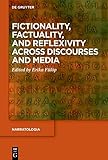Fictionality, Factuality, and Reflexivity Across Discourses and Media / ed. by Erika Fülöp.
Material type: TextSeries: Narratologia : Contributions to Narrative Theory ; 75Publisher: Berlin ; Boston : De Gruyter, [2021]Copyright date: ©2021Description: 1 online resource (VIII, 266 p.)Content type:
TextSeries: Narratologia : Contributions to Narrative Theory ; 75Publisher: Berlin ; Boston : De Gruyter, [2021]Copyright date: ©2021Description: 1 online resource (VIII, 266 p.)Content type: - 9783110720891
- 9783110722154
- 9783110722031
- 418 23/eng/20231120
- online - DeGruyter
- Issued also in print.
| Item type | Current library | Call number | URL | Status | Notes | Barcode | |
|---|---|---|---|---|---|---|---|
 eBook
eBook
|
Biblioteca "Angelicum" Pont. Univ. S.Tommaso d'Aquino Nuvola online | online - DeGruyter (Browse shelf(Opens below)) | Online access | Not for loan (Accesso limitato) | Accesso per gli utenti autorizzati / Access for authorized users | (dgr)9783110722031 |
Frontmatter -- Acknowledgements -- Contents -- Introduction -- A Logue -- A Puzzle about Fictional “I”s -- Postmodern Fables, Correlationism, and Speculation -- Fictionalizing Metafiction -- Portals of Fiction -- The End of Fact vs Fiction: Reflexivity in Ancient Narratives -- Writing and Reflections on Fictionality in Old Japanese Literature -- Factualized Fictions: David Foster Wallace’s Self-Reflexive Metafiction -- Historical Reference and (Auto)Fiction in the Recent Latin American Novel -- Authorial Self-Personalization and Cine-Vision in the Film Jane B. par Agnès V. (1988) -- Disrupting the Illusion by Bolstering the Reality Effect in Film -- The Iconomics of Reflexivity: The Real Value of Images of Fiction in Contemporary American Cinema -- Playing with (Meta)Fictionality and Self-Reflexivity in the Video Game The Stanley Parable -- Virtual Mirrors: Reflexivity in Digital Literature -- Notes on Contributors -- Index of Names -- Index of Concepts
restricted access online access with authorization star
http://purl.org/coar/access_right/c_16ec
Concerned with the nature of the medium and the borders between fact and fiction, reflexivity was a ubiquitous feature of modernist and postmodernist literature and film. While in the wake of the post-postmodern “return to the real” cultural criticism has little time for discussions of reflexivity, it remains a key topic in narratology, as does fictionality. The latter is commonly defined opposition to the real and the factual, but remains conditioned by historical, cultural, discursive, and medium-related factors. Reflexivity blurs the boundaries between fact and fiction, however, by giving fiction a factual edge or by questioning the limits of factuality in non-fictional discourses. Fictionality, factuality, and reflexivity thus constitute a complex triangle of concepts, yet they are rarely considered together. This volume fills this gap by exploring the intricacies of their interactions and interdependence in philosophy, literature, film, and digital media, providing insights into a broad range of their manifestations from the ancient times to today, from East Asia through Europe to the Americas.
Issued also in print.
Mode of access: Internet via World Wide Web.
In English.
Description based on online resource; title from PDF title page (publisher's Web site, viewed 25. Jun 2024)


